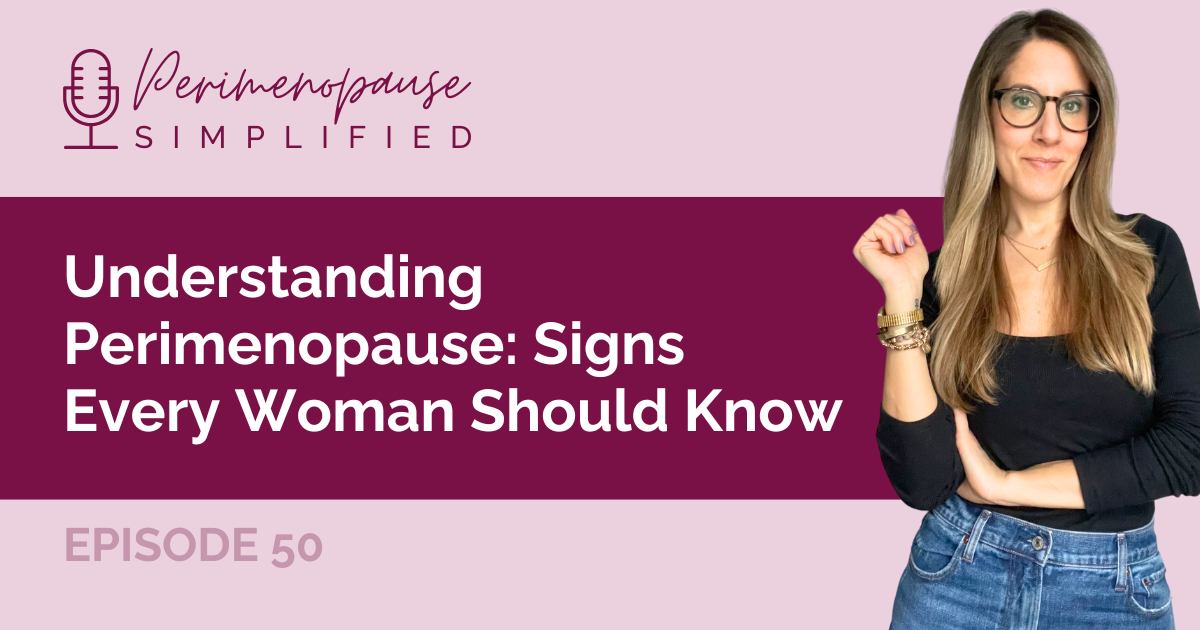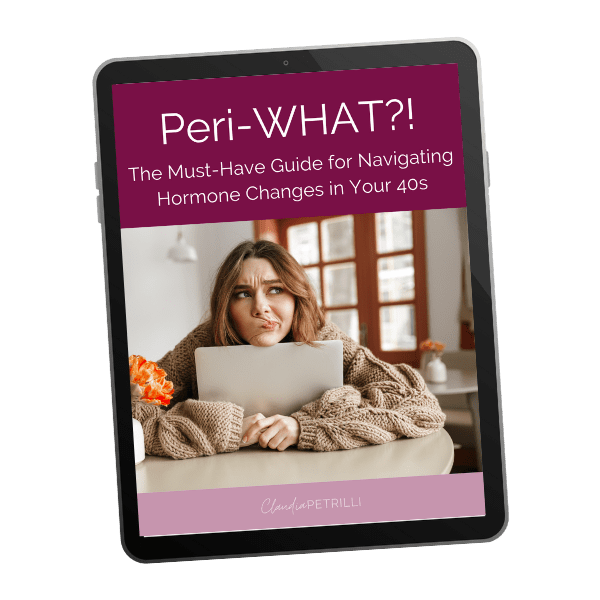
50. Understanding Perimenopause: Signs Every Woman Should Know
Don’t Miss An Episode!
Perimenopause is a significant but often misunderstood phase in a woman’s life, typically starting in the late 30s or 40s. It’s marked by fluctuating hormones that can cause symptoms like mood swings, sleep disturbances, fatigue, brain fog, and weight changes. While these shifts are natural, they can also impact long-term health, increasing the risk of conditions like heart disease, osteoporosis, and type 2 diabetes.
In this episode, I break down what perimenopause is, common symptoms to watch for, and why this stage is a critical time to prioritize your health. I also share how The Perimenopause Method offers a personalized, science-backed approach to navigating this transition with advanced testing, targeted nutrition, and ongoing support—so you can feel your best now and for years to come.
We covered:
- What is perimenopause?
- When does perimenopause occur?
- What hormones are responsible for perimenopause symptoms?
- Most common perimenopause symptoms women experience
- Not-so-obvious perimenopause symptoms
- Why this stage of life is so crucial
- Why our clients get results and improve their health
Hey, welcome to the show! Whether you’re new here or a longtime follower, this episode is a must-listen. I thought I’d do a bit of a recap so you understand what perimenopause is, when it starts, the key signs and symptoms to look out for, and why this stage of life is so crucial. Let’s get to it!
What is Perimenopause?
Perimenopause is the transitional phase before menopause. Menopause occurs after 12 consecutive months without a period. Perimenopause can begin as early as your mid-30s, but most women start to notice symptoms in their 40s.
It’s when hormones fluctuate A LOT – especially estrogen, which is your more stimulating hormone, and progesterone, which is your more calming hormone. These fluctuations can cause a wide range of symptoms.
During this phase, your ovaries are gradually winding down and no longer want to produce hormones. But it’s not a linear process. Hormone levels can fluctuate wildly, day to day, creating symptoms that range from annoying, like bloating, to downright life-altering, like anxiety and depression. Estrogen can be high one day, low the next. Progesterone is a hormone we produce all month at low levels, but we get a peak after ovulation. In perimenopause, we are not ovulating regularly—if at all—so we’re not making enough of this amazing hormone.
While this hormonal rollercoaster is a “natural” part of aging, it’s not something you just have to accept. Many women start to feel like they’ve lost control over their health and overall well-being.
Common Signs of Perimenopause
So, what are the signs of perimenopause? Here are some of the most common ones:
Mood Swings and Irritability
Fluctuating hormones can affect your mental health. You may have really low moods where you’re sad, crying, and more emotional. On other days, you may feel irritable, snapping at your kids or husband, and getting annoyed by small things—like people breathing or chewing too loudly.
Sleep Disturbances
You may have trouble falling or staying asleep. Many women wake up in the middle of the night, unable to fall back asleep, possibly due to hot flashes or night sweats, another common symptom.
Fatigue
Feeling tired, even after a full night of sleep. You may have low motivation and just want to lay around all day.
Weight Changes
Many women notice weight gain or weight loss resistance, especially around the midsection.
Brain Fog
You may have trouble remembering things, focusing, or may even have been diagnosed with ADHD. While that diagnosis may feel like an answer, it doesn’t address the hormone changes occurring.
Vaginal Dryness and Changes in Libido
These symptoms are often overlooked but can significantly impact quality of life and relationships.
Irregular Periods
Your cycle may get shorter, longer, or more unpredictable.
Some other not-so-obvious symptoms include hair loss, UTIs, changes in body odor, digestive issues like gas, constipation, acid reflux, joint pain, and heart palpitations.
If any of these resonate with you, know that you’re not alone. Millions of women experience these changes, and understanding them is the first step to improving your health.
Why Perimenopause Matters for Long-Term Health
Perimenopause is more than just a phase of annoying symptoms—it’s a critical window for your long-term health. The hormonal shifts happening during this time don’t just affect how you feel day-to-day; they can significantly impact your future risk of chronic diseases.
As estrogen and progesterone levels fluctuate and decline, your body undergoes changes that can increase your vulnerability to:
Type 2 Diabetes
Losing estrogen can affect how your body processes insulin, making blood sugar regulation more challenging.
Heart Disease
Estrogen plays a protective role in heart health. As levels drop, your risk of high blood pressure, cholesterol imbalances, and cardiovascular disease rises.
Dementia
Emerging research links hormonal changes during perimenopause to brain health, including memory and cognitive function.
Osteoporosis
Estrogen and progesterone are critical for bone density. When they decline, it can lead to bone loss and an increased risk of fractures.
Cancers
While the risk varies from person to person, certain cancers—such as breast and uterine cancer—can be influenced by hormonal changes and lifestyle factors.
By addressing your health now—through lifestyle changes, stress management, targeted nutrition, advanced testing, and hormone support—you’re not just improving your current quality of life; you’re also laying the foundation for healthier aging.
Think of perimenopause or the symptoms you’re experiencing as your body’s call for attention: the choices you make now can dramatically shape how you feel a decade from now and beyond.
The Perimenopause Method: Personalized Support for Your Transition
This is why getting the right support during perimenopause is so important. With the right guidance, you can identify imbalances early, reduce risks, and create a plan that empowers you to thrive through this transition—and for the rest of your life.
My program, The Perimenopause Method, is designed for women in their mid-30s to mid-50s who are navigating the challenges of hormone fluctuations and decline. This isn’t a one-size-fits-all approach—it’s personalized to meet your unique needs.
What’s Included in The Perimenopause Method?
- Advanced Testing: We go beyond the basics with tests like hair tissue mineral analysis (minerals are the spark plugs of life and essential for hormone production and detoxification), comprehensive bloodwork review from a functional health perspective, and stool testing to uncover the root causes of your symptoms.
- Transformative Coaching: You receive guidance on optimizing your nutrition, sleep, stress management, how to navigate the confusing world of HRT, and more.
- Ongoing Support: You’ll never feel alone in this journey. Our community and team are here to provide encouragement and accountability every step of the way.
Whether you’re struggling with fatigue, mood swings, sleep disruption, weight gain, or just feeling disconnected from your body, The Perimenopause Method is here to help you feel empowered and in control of your health.
Take the Next Step
Check out the link in my bio to learn more or email claudia@claudiapetrilli.com if you have questions. Don’t wait to prioritize your health, ladies.
Thank you so much for being here today. If you found this episode helpful, please share it with a friend, subscribe to the podcast, and leave a review. Your support helps more women discover the resources they need during this crucial phase of life.
Until next time!
Learn about The Perimenopause Method HERE and get started today! When you enroll by January 31st, you’ll get a bonus coaching session with me ($300 value).
Sources:
https://pmc.ncbi.nlm.nih.gov/articles/PMC6320346/
https://www.utsouthwestern.edu/newsroom/articles/year-2023/oct-estrogen-anti-diabetic-effects.html
https://pmc.ncbi.nlm.nih.gov/articles/PMC10074318/
https://pmc.ncbi.nlm.nih.gov/articles/PMC10480684/
https://pubmed.ncbi.nlm.nih.gov/35163300/
Claudia Petrilli is a Functional Health Coach, Integrative Nutrition Coach, Women’s Health Educator, and creator of The Hormone Rescue program. Having experienced debilitating periods, digestive issues, a sluggish thyroid, a pituitary tumor, and perimenopause symptoms in her late 30s, she knows exactly what it’s like to get dismissed by doctors and spend years searching for answers.
Need guidance on hormone replacement therapy?:
Need guidance on hormone replacement therapy? Check out Claudia’s course: Perimenopause HRT Roadmap to learn the ins and outs of hormone replacement therapy, get empowered with easy-to-understand information & gain confidence to advocate for yourself and get the support you need!
Free Resources:
Peri-What?! The Must-Have Guide for Navigating Hormone Changes in Your 40s
Programs:
Connect with Claudia:
Have a question or episode topic suggestion? Please email: claudia@claudiapetrilli.com.
Love the show? Please subscribe, leave a 5-star rating, review, and share with others, so more women can find this podcast for guidance and support through their perimenopause journey!






